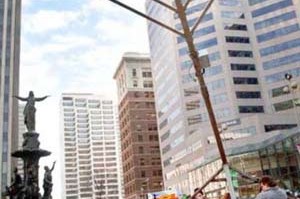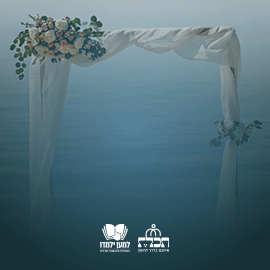ארצות הברית: החל המאבק על האור

המשפטן רוברט ריווס, שמתנגד בפומבי להצבתה של החנוכיה, פרסם היום (ב') מאמר מפורט בעניין זה ב"טלהסי דמוקרט", בניסיון להשפיע על החלטות חברי הועידה. במאמרו, מחזק ריווס את הראייה המשפטית הנוקשה לפיה חנוכיה היא "מיצג דתי" שסביבו מתנהלים מידי יום "טקסים דתיים", והצבת 'מנורה' בשטח ציבורי "כמוה כאמירה דתית של הרשויות".
מול הדברים המגמתיים, מתארים יהודים רבים את היחס המפלה, כאשר מוצגי החגאות הנוצריות מפארות כל פינה ציבורית, ואילו הצגת מוצג יהודי נאסרת פעם אחר פעם.
גם בעיירה גלֶנְבְיוּ שבמדינת אילינויס, שוררת דריכות רבה עקב פרסום תיקון לחוק העזר העירוני. על פי החוק המתוקן, מותר להציב גם במתחמים שבבעלות הרשויות "מוצגים חגיגיים שאינם בעלי אופי דתי מובהק".
הפרשנות סביב ההגדרה המפולפלת, מעוררת מחלוקת ציבורית. בעוד גורמים שונים טוענים שוב שהחנוכיה היא מיצג דתי מובהק (ובאותה נשימה מוציאים מכלל זה מוצגים קתוליים המוגדרים כ"עממיים שאינם דתיים") – טוען שליח חב"ד הרב דניאל מוסקוביץ כי התיקון בחוק שולל כל עילה לדחות את בקשתו, להצבת חנוכיית ענק ברחובה של עיר. יש לציין כי עד כה נדחתה בקשתו כבר פעמיים ע"י הרשויות.
ובשולי הדברים מעניין כי אחד מהטיעונים המרכזיים שמגייס העו"ד רוברט ריווס במאמרו,שכאמור מצדד באיסור הצבת החנוכיות הציבוריות – היא עובדת התנגדותם העקבית של גורמים יהודיים.
"באופן אירוני", כותב ריווס, "בשנה שעברה נוהלה האופוזיציה שהתנגדה להצבת החנוכיות – לא ע"י גורמי ממשל שחרדים לשמירת החוק, אלא דווקא ע"י יהודים חשובים" (כהגדרתו) "שטוענים כי התדמית המקודשת של המנורה תיפגם אם יותר להציבה ברשות הרבים, דבר שיהפוך אותו לזול בעיני הציבור".
"יתירה מכך" מוסיף ריווס, "גורמים יהודיים אלו טוענים כי אם כעת יעלימו עין מהפרת ההפרדה בין דת ומדינה כשחב"ד תציב את המנורה – ייאלצו להמשיך בשתיקתם גם כאשר ברשות הרבים יוצבו סמלי-דת נוצריים מקודשים".
שליחי חב"ד במדינות אלו פועלים במגוון דרכים להוכיח את מגמתיות הטיעונים המגוחכים, ומקווים כי גם השנה האור יגבר, ופעילות חנוכה תתקיים במלוא המרץ.
The menorah is back on the Leon County Commission's agenda Tuesday, having been pushed aside, but not resolved, a year ago this holiday season.
A series of missteps caused misunderstanding, controversy and hard feelings during last year's season of peace. Late one night, without prior notice and when the county attorney was absent, county commissioners voted to purchase an 18-foot-tall menorah and install it front of the courthouse to celebrate Hanukkah.
Because the menorah would be near the annual Christmas tree, Chabad Lubavitch of the Panhandle-Tallahassee thought it sought only equal time, or a sense of ecumenism. Opposition arose immediately, and the county attorney persuaded the commissioners to reconsider.
He noted that he would have warned them, if he had been properly consulted, that the menorah display, coupled with religious observances planned around the menorah every night of Hanukkah, would run afoul of the Establishment Clause of the First Amendment.
Chabad once again has asked the county to erect the menorah. This time, County Attorney Herb Thiele has submitted a report warning that the menorah could cause legal problems for the county, depending on the exact circumstances of its purchase, construction, placement and usage.
Ironically, last year the opposition was led not only by the local chapter of the American Civil Liberties Union, but also by prominent Jews. They see the menorah as a sacred religious symbol, one that would be debased by being treated as a cultural symbol, not necessarily religious, of the holiday season.
More importantly, those Jewish opponents are carrying on the tradition established by the founding fathers when they wrote, in the Establishment Clause, that "Congress shall make no law respecting an establishment of religion." They fear that if they sit idly by while the local government openly endorses Judaism, they will have no recourse when then government next openly endorses Christianity, to the dismay they will then feel.
The authors of the Constitution sought to protect religious liberty by enacting two equally important measures, side by side, in the First Amendment. One, the Free Exercise Clause, forbade the government from "prohibiting the free exercise" of religion, while the Establishment Clause enjoined the government from endorsing, selecting, taxing or otherwise getting involved in religion.
Thomas Jefferson, in a letter to a Baptist group assuring them that they would not be subjected to discrimination by an Anglican or Catholic government under the new Constitution, was the first to coin the phrase "separation of church and state." He wrote: "I contemplate with sovereign reverence that act of the whole American people which declared that their legislature should 'make no law respecting an establishment of religion or prohibiting the free exercise thereof,' thus building a wall of separation between church and State." The founders obviously were not hostile to religion. They sought to protect religion by keeping the government out of it.
Religion flourishes in American as it does in few other places. A University of Michigan study found that 46 percent of American adults attend church at least once a week, not counting weddings, funerals and christenings, compared with 14 percent of adults in Great Britain, 8 percent in France, 7 percent in Sweden and 4 percent in Japan.
Religion does not fare better among the populace in countries where the government promotes religion. France is officially Catholic, yet the number of French people who attend church once a week dropped from a mere 11 percent in 1981 to 8 percent in 2001. In England, which is officially Anglican, the figure remained steady at a mere 14 percent. In Germany, local churches are supported by a national church tax, and yet the number of people who attend church at least once a week dropped from 19 percent in 1981 to 16 percent in 2001.
One recent poll found that 53 percent of Americans consider their religion to be "very important" in their lives, while the same view was shared by only 16 percent in Britain, 14 percent in France and 13 percent in Germany.
Should anyone in this country be jealous that those governments are allowed to endorse religion? Only someone who is truly hostile to religion should want the government to get involved in it.
In seeking to enforce the Establishment Clause, the ACLU does not show hostility to religion. The ACLU regularly litigates in support of the right to practice religion.
The Establishment Clause and the Free Exercise Clause are two sides of the same coin. For the government to promote one religion is to discriminate against others. When the county considers the proposed menorah, its job will be to protect religion by recognizing both of these constitutional values, and, yes, to promote the spirit of the holidays.





















 מאפשרים לכם לקבל
מאפשרים לכם לקבל
